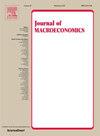消费者偏好,对分立货币的需求,以及通货膨胀带来的福利成本
IF 1.3
3区 经济学
Q3 ECONOMICS
引用次数: 1
摘要
本文运用新古典需求理论来计算通货膨胀的福利成本。它考虑了货币、消费品和休闲之间的需求互动,放松了固定消费者偏好的假设,并解决了货币需求函数的估计、货币需求关系的不稳定性和货币聚合等相互关联的问题。它充分利用了相关的经济理论和计量经济学,并根据通货膨胀的长期福利成本得出了与所用数据和模型内部一致的推论。本文章由计算机程序翻译,如有差异,请以英文原文为准。
Consumer preferences, the demand for Divisia money, and the welfare costs of inflation
This paper uses neoclassical demand theory to calculate the welfare costs of inflation. It considers the demand interactions between money, consumption goods, and leisure, relaxes the assumption of fixed consumer preferences, and addresses the inter-related problems of estimation of money demand functions, instability of money demand relations, and monetary aggregation. It makes full use of the relevant economic theory and econometrics and generates inference in terms of long-run welfare costs of inflation that is internally consistent with the data and models used.
求助全文
通过发布文献求助,成功后即可免费获取论文全文。
去求助
来源期刊

Journal of Macroeconomics
ECONOMICS-
CiteScore
2.50
自引率
7.10%
发文量
53
审稿时长
76 days
期刊介绍:
Since its inception in 1979, the Journal of Macroeconomics has published theoretical and empirical articles that span the entire range of macroeconomics and monetary economics. More specifically, the editors encourage the submission of high quality papers that are concerned with the theoretical or empirical aspects of the following broadly defined topics: economic growth, economic fluctuations, the effects of monetary and fiscal policy, the political aspects of macroeconomics, exchange rate determination and other elements of open economy macroeconomics, the macroeconomics of income inequality, and macroeconomic forecasting.
 求助内容:
求助内容: 应助结果提醒方式:
应助结果提醒方式:


